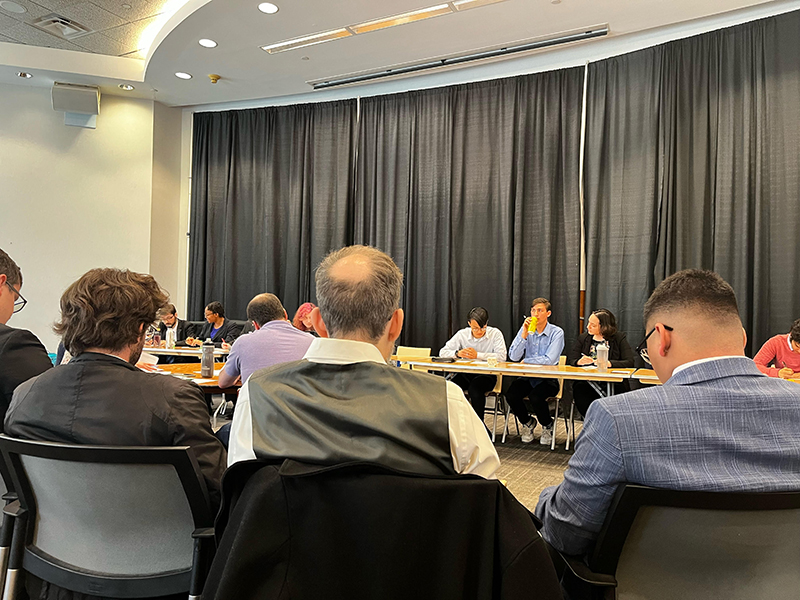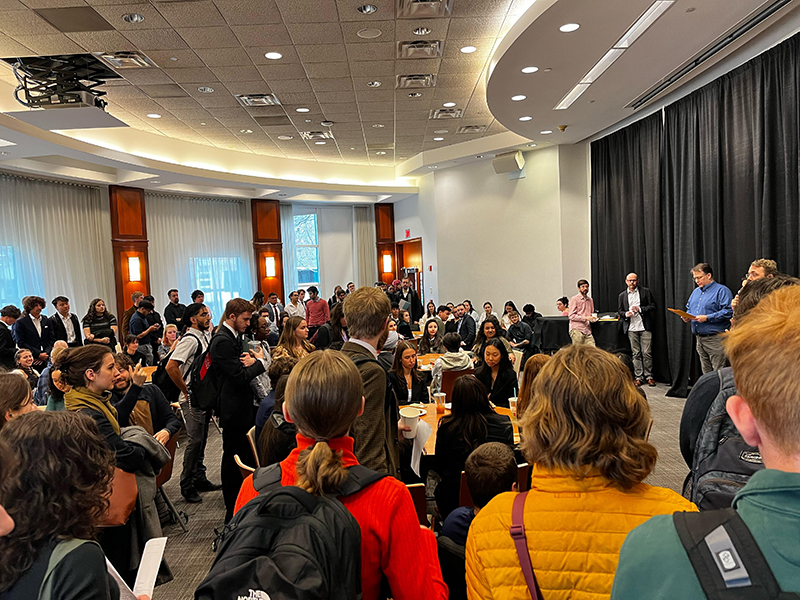 The National Bioethics Bowl is an annual tournament that brings together teams from colleges and universities around the country to discuss ethical challenges in biomedicine and technology. Northeastern University hosted this year's competition on April 15, 2023. Participants from the Center's community included Jonathan Marron, MD, MPH, Leanne Homan, RN, BSN, MBE, Julie Allouche, JD, LL.M., Basel Tarab, MD, MHA, Sarah Gabriele, LL.M., and Adam Ghiles Briki, MBBS, BSc (Hons).
The National Bioethics Bowl is an annual tournament that brings together teams from colleges and universities around the country to discuss ethical challenges in biomedicine and technology. Northeastern University hosted this year's competition on April 15, 2023. Participants from the Center's community included Jonathan Marron, MD, MPH, Leanne Homan, RN, BSN, MBE, Julie Allouche, JD, LL.M., Basel Tarab, MD, MHA, Sarah Gabriele, LL.M., and Adam Ghiles Briki, MBBS, BSc (Hons).
Tarab, a current student in the Master of Science in Bioethics degree program, was part of the judging team. "I was very impressed with the level of participation, the selection of cases, and the preparedness of the teams. Although the cases were available in advance, I decided not to review them before the competition to avoid forming any opinions and mitigate my subconscious biases. The cases were thought-provoking and interesting," he said, "I was specifically interested in the case titled 'Barring Disabled Immigrants to Control Costs' as it reminded me of the Public Charge Rule in some aspects. Judging in the competition resembled, to some extent, the day-to-day bioethics work in which we are entitled to form our own opinions as long as these opinions do not cloud our judgment and recommendations."
Briki, also an MBE student, "was blown-away and inspired by the depth of engagement and multitude of perspectives that the students drew from." He said, "It was a huge relief to know that our field is in the hands of so many interested, inspiring and brilliant young people."
 Allouche, the Center's Events Coordinator, discussed her motivation for participating as a judge this year, saying, "It was very important to me because I wanted to see what my job could look like one day. Indeed, my dream is to be a bioethics attorney. I would like to represent clients in situations like those discussed at this tournament" with a focus on end-of-life care, resource allocation, and genetic modification. One of the more intriguing cases for her discussed the possibility of conceiving a child with three different DNAs. "The objective was to remove a gene carrying a serious disease and replace it with a healthy gene from a donor," Allouche explained, "I found this case interesting because it invites us to question ourselves about the benefits and the drawbacks of genetic modification."
Allouche, the Center's Events Coordinator, discussed her motivation for participating as a judge this year, saying, "It was very important to me because I wanted to see what my job could look like one day. Indeed, my dream is to be a bioethics attorney. I would like to represent clients in situations like those discussed at this tournament" with a focus on end-of-life care, resource allocation, and genetic modification. One of the more intriguing cases for her discussed the possibility of conceiving a child with three different DNAs. "The objective was to remove a gene carrying a serious disease and replace it with a healthy gene from a donor," Allouche explained, "I found this case interesting because it invites us to question ourselves about the benefits and the drawbacks of genetic modification."